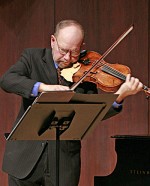Column Name
Title
Born in Long Beach, N.Y., Samuel Rhodes grew up in Rosedale, Queens, and received his B.A. from Queens College and his M.F.A. from Princeton University. He became the violist of the Juilliard String Quartet in 1969, at which point he also joined the Juilliard faculty.
Body
When did you know you wanted to be a musician?
My mom was a good pianist who taught in our neighborhood; my dad was not professionally involved with music but loved it. We had music going on in our home all the time, especially on the radio: the NBC Symphony with Toscanini conducting, the Metropolitan Opera, other major orchestra broadcasts, the WQXR String Quartet. When I was quite young, I was fascinated by the Beethoven piano sonatas and would ask my mom what all the different, incomprehensible signs meant. Through listening and later playing and composing, I developed a passionate interest that has never left me. I knew when I was about 10 that music would be an important part of my life.
Who most inspired you when you were growing up?
There were two people besides my parents. My first violin (and later viola) teacher, Sydney Beck, was a musicologist who was the assistant chief of the music research division at the New York Public Library. He instilled in me a sense of style, especially for the Baroque and Classical periods. He had thoroughly researched the performance practice of earlier periods long before that had become as popular as it is today. He also was insistent that I develop a strong self-critical sense, particularly for intonation. I still hear him as my musical conscience when I practice.
The other person was my uncle Charles Rhodes, a true renaissance man. He was trained as a lawyer but was able to retire early and pursue his many other interests. He was a self-taught composer and recording engineer who recorded many memorable performances from the radio to at first 78 r.p.m. and later 33 1/3 r.p.m. records. He had the largest private book and record library I have ever seen. I would immediately gravitate there when we visited and incessantly peruse the musical scores. The most complicated of these to my young eyes were the scores of Wagner operas. Looking at them, I developed an insatiable interest in finding out about the different instruments, clefs, and transpositions [and also] tried to find in the score exactly where the important events in the plot took place, especially where a particular character died. When my uncle switched to the “newer technology,” LPs, he gave us all of his 78s, about 5,000 records! I would spend hours listening to them—much more interesting than practicing—with scores borrowed either from him or the public library.
What’s the most embarrassing moment you’ve had as a performer?
I found myself on the stage of a sold-out Carnegie Hall with my fly open! What do you do about that? Nothing! You hope no one notices and wait for the end of the piece to get offstage and correct the problem.
If you could have your students visit any place in the world, where would it be?
Israel. You can see and feel the numberless layers of history everywhere you look. Even more importantly, you see the intertwined relationships of the three major Western religions and are horrified that people are capable of killing each other in large numbers rather than binding together with mutual respect and tolerance.
What are your non-music-related interests or hobbies?
I love trains and take every opportunity when the J.S.Q. travels to use the trains in Europe or Japan. When I was young, after my music lessons on Saturdays, I would often disappear for too long in the maze of the subway network and my parents would be worried sick. My 4-year-old grandson, Evan, shows strong signs of inheriting this passion!
If your students could remember just one thing from your teaching, what would you want it to be?
I would be very happy if, amid all the musical and technical information that is normally discussed, I could impart to each of my students something that would deepen their passion for music so much that it would become, even more than it may have been before, an emotional and spiritual necessity for the rest of their lives.
What book are you reading right now?
One advantage of being a touring musician is that you have quite a bit of time to read. I just finished The Lady Elizabeth by Alison Weir. It is a vivid and well-researched historical novel about the young Elizabeth I amid the political and religious turmoil of England during the reigns of Henry VIII, Edward VI, and Mary Tudor. Weir is a historian as well as a novelist, and she brings out the difference between one and the other so that you know when she is departing from strict historical fact and adding her own speculation or fantasy to embellish what might be unknown. I love reading about history; I audited a seminar on Ottoman history when I was at Princeton, and I enjoy imagining what life was like in other eras and other parts of the world.
If you weren’t in the career you are in, what would you be doing?
In my fantasy life I would have been the center fielder and later manager of the New York Yankees or a heldentenor singing Tristan on the stage of the Metropolitan Opera. More realistically, I might have been a historian and a teacher of history or a civil engineer in charge of the New York Subway system. All things considered however, I would rather keep my day job!





